
Publish time: Mon Nov 07 14:33:56 CST 2016
On the afternoon of October 17 2016, the Beijing Arbitration Commission / Beijing International Arbitration Center (the “BAC”) hosted its first roadshow during the Hong Kong Arbitration Week 2016 jointly with the Chartered Institute of Arbitrators (East Asian Branch) (the “CIArb (EAB)”), and successfully held the “Opportunities and Challenges under the Belt and Road Initiative: 2016 Hong Kong Summit on Financial and Investment Dispute Resolution in China” (the “Hong Kong Summit” or the “Summit”).
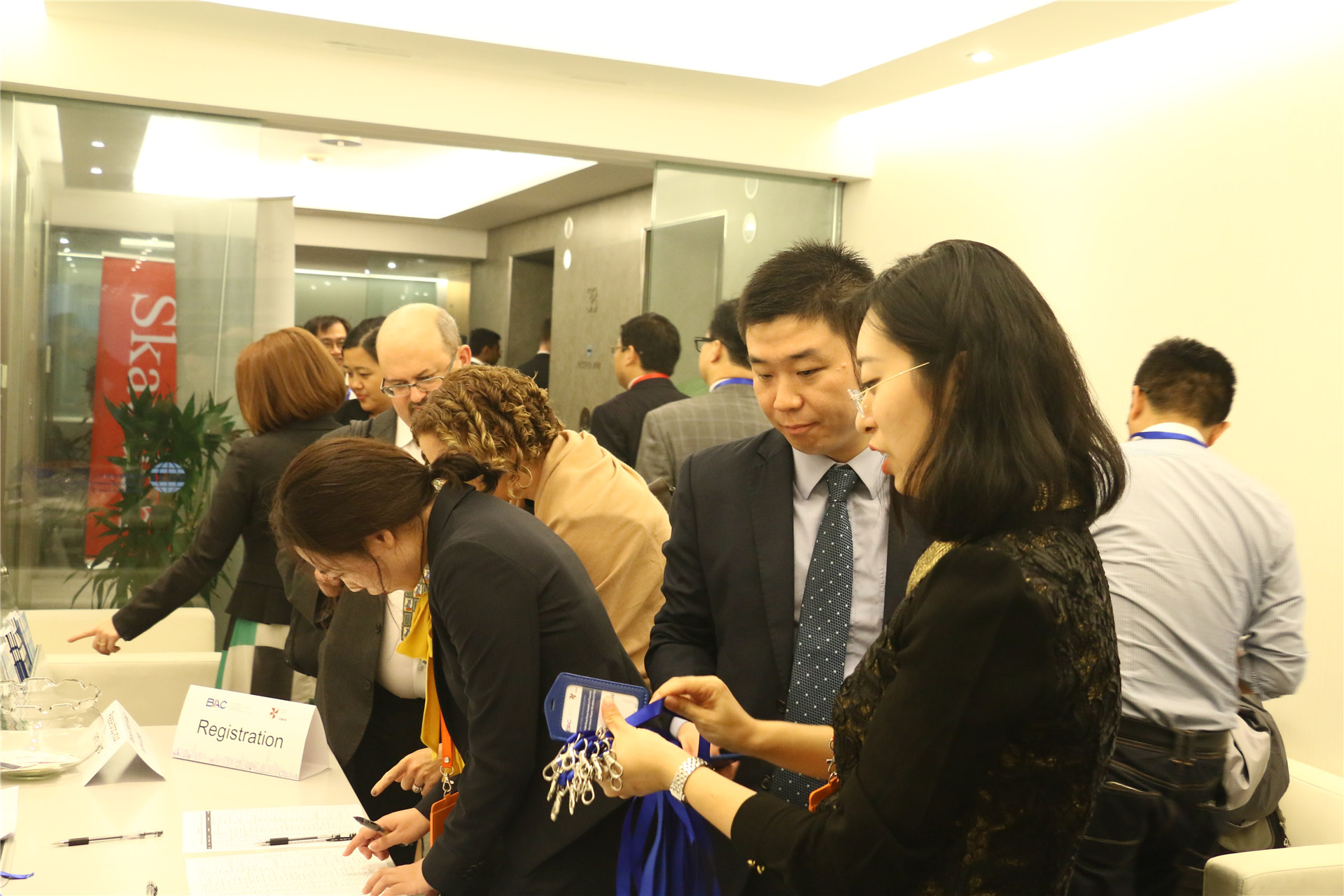
Registration
The Hong Kong Summit was the fourth overseas summit of the year on Commercial Dispute Resolution in China organized by the BAC in succession to the summits held in London, Frankfurt and Hague, and also the first event hosted by the BAC as a participant of the Hong Kong Arbitration Week. Since the launch of the Belt and Road Initiative by the PRC government, more than 60 countries and regions have already involved in such Initiative. Enterprises from China, the founding state thereof, will surely have more overseas investment and bring in new international financial cooperation. With the furtherance of transnational economic exchanges, more international disputes will emerge, and thus it is of significant value to strengthen the exchanges on legal system, economic systems and dispute resolution practice in China and other jurisdictions, which will be helpful to deepen mutual understanding, to establish mutual trust and to better resolve disputes arising from international commerce. With such a background, the BAC wisely selected the Hong Kong Arbitration Week as one more opportunity, and Hong Kong, featured with the role of international financial center where the oriental and the western cultures interweaved, as the venue, to host this Hong Kong Summit based on both the Commercial Dispute Resolution in China: An Annual Review (2016) it organized and the leading topics of finance and investment under the Belt and Road Initiative, looking forward to having dialogue and communication with international dispute resolution professionals and practitioners, presenting and marketing the Chinese arbitration practice and approaches, and promoting in-depth exchanges and cooperation about international commercial dispute resolution. Renowned experts within the international dispute resolution community were invited to this event as speakers, who, with unique views, have attracted over one hundred legal professionals and experts, both domestic and abroad.
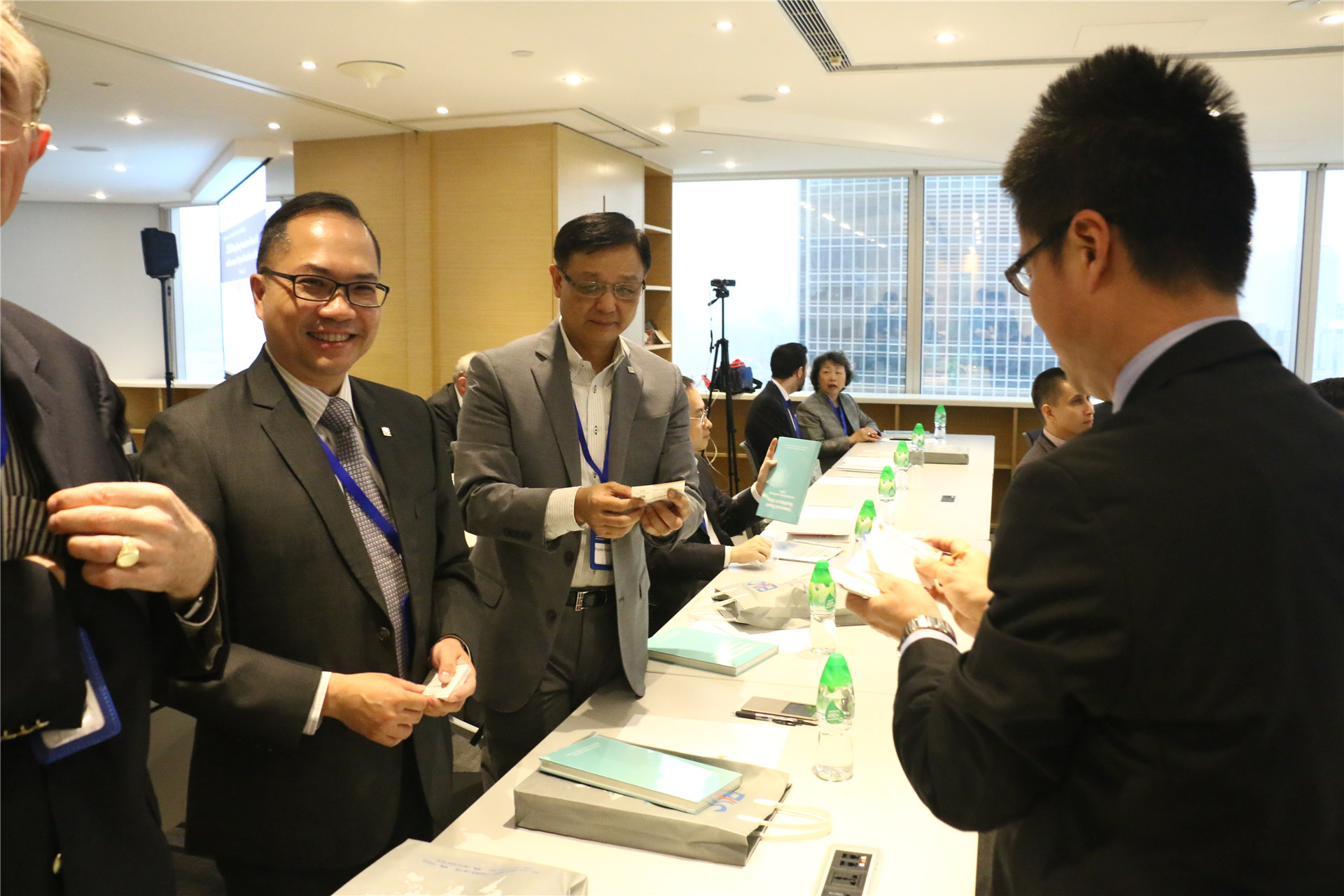
Exchanges between Attendees
The opening ceremony of the summit was moderated by Mr. David Fong, Vice-Chairman of the CIArb (EAB). Madame Wang Hongsong, Vice-Chairperson of the BAC, Mr. Richard Leung, Chairman of the CIArb (EAB), and Mr. Wang Zhenmin, Director-General of the Law Department of the Liaison Office of the Central People’s Government in Hong Kong SAR, delivered their opening speeches respectively.
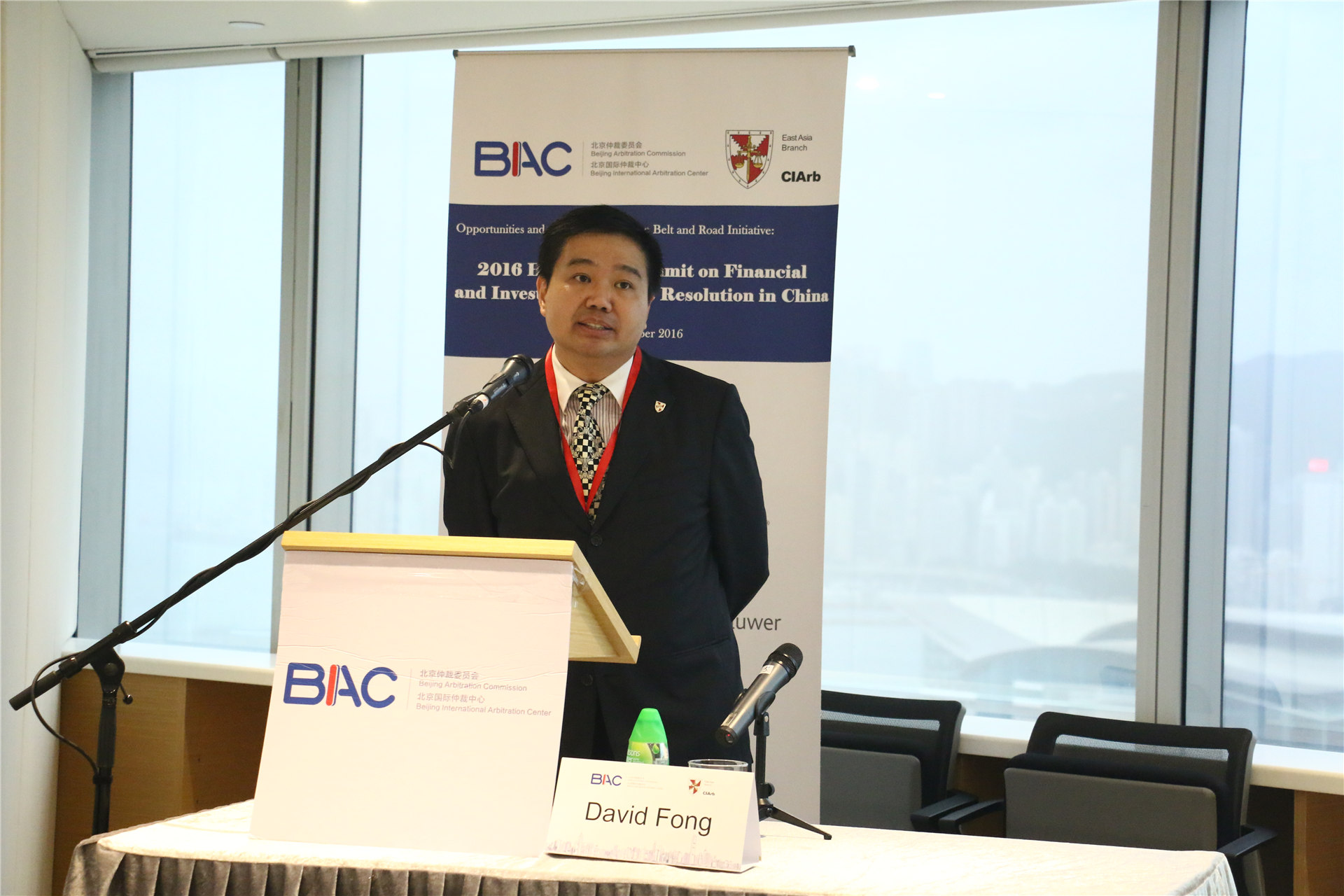
Mr. David Fong
Madame Wang Hongsong firstly welcomed all the attendees on behalf of the BAC, and expressed thanks to the joint organizer and supporting institutions of this event. Madame Wang pointed out that the Belt and Road Initiative as an important national strategy, aimed at promoting mutual trust in politics, integration of economy and inclusiveness in culture, and thereby realizing peace, stability and joint prosperity among relevant countries and regions along the Belt and Road. With the implementation of the Belt and Road Initiative and the growth of investment and trade in these countries and regions, the legal service and the dispute resolution industries are embracing new opportunities and developments. Therefore, it is important to strengthen the cooperation and exchange within the international arbitration community, especially among arbitration practitioners from the Belt and Road countries and regions. The global economic integration requires that the cooperation in economy nowadays must be based on the cooperation in legal services. With regard to dispute resolution, Madame Wang said that such cooperation mainly included four aspects: firstly, to strengthen the exchange of and the cooperation on legal information such as laws, regulations and rules; secondly, to enhance the cooperation between arbitration institutions, in order to provide arbitration users with more conveniences in the matters of hearing facilities, appointment of arbitrators, application of arbitration rules, accommodation and transport and so forth; thirdly, to promote academic exchange, experience sharing and personnel training cooperation, with the aim of raising dispute resolution service providers’ professional competence and thinking level; and fourthly, to improve the research and cooperation on dispute resolution rules, so as to better make dispute resolution options and rules with the aid of the group wisdom of legal experts within the dispute resolution community that can fit the features of the Belt and Road countries and regions.
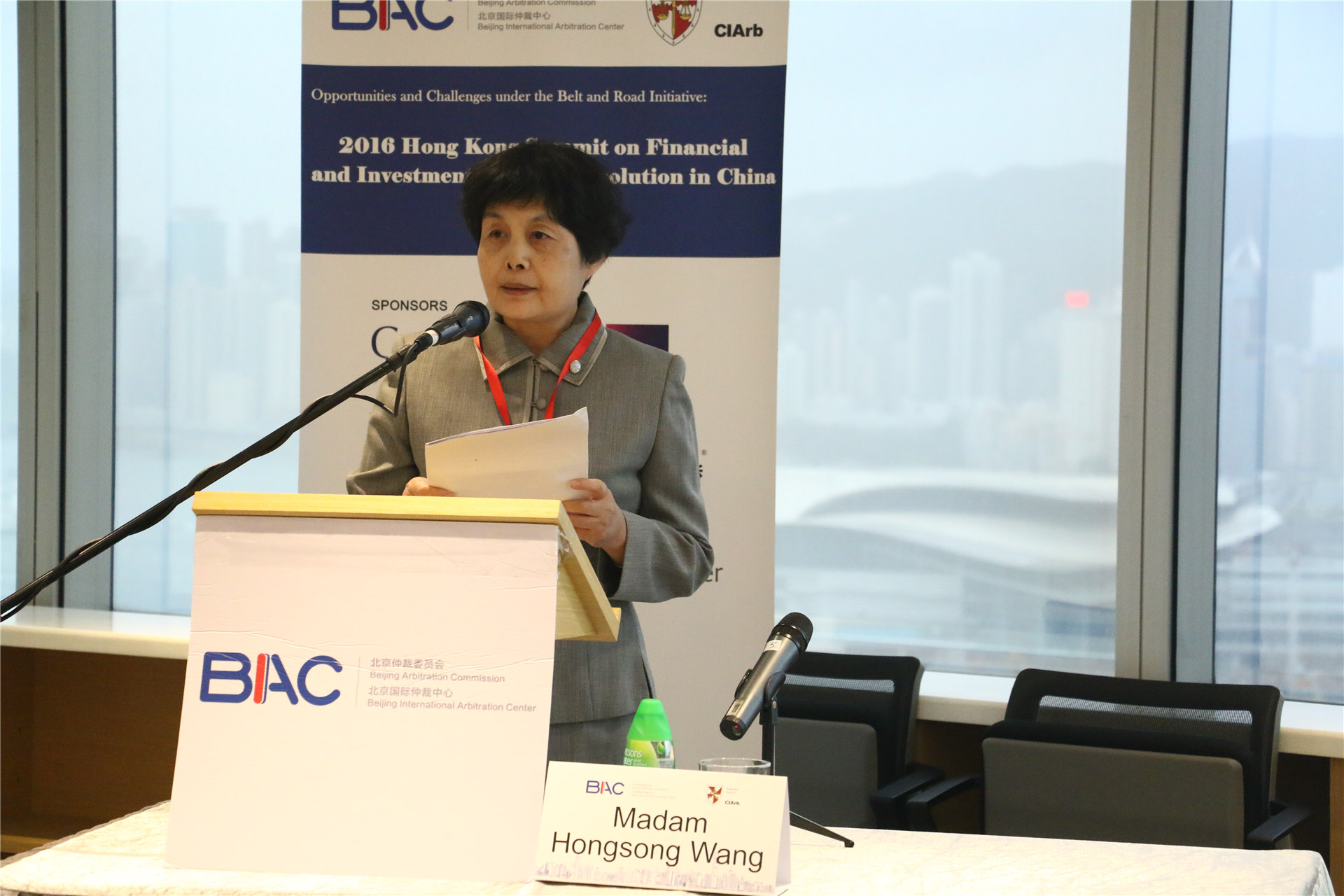
Madame Wang Hongsong
Mr. Richard Leung then made his address on behalf of the CIArb (EAB). He briefly introduced the CIArb, and called for further cooperation and exchange among legal professionals, arbitration institutions and academics under the Belt and Road Initiative. Meanwhile, Mr. Leung was of the opinion that arbitration would become the firstly chosen mechanism for settling disputes under the Belt and Road Initiative, and to parties in disputes, the selection of the seat of arbitration and the arbitration institution would become more and more diversified, and thus arbitration institutions should further polish their arbitration rules and improve their services to meet the requirements of arbitration users.
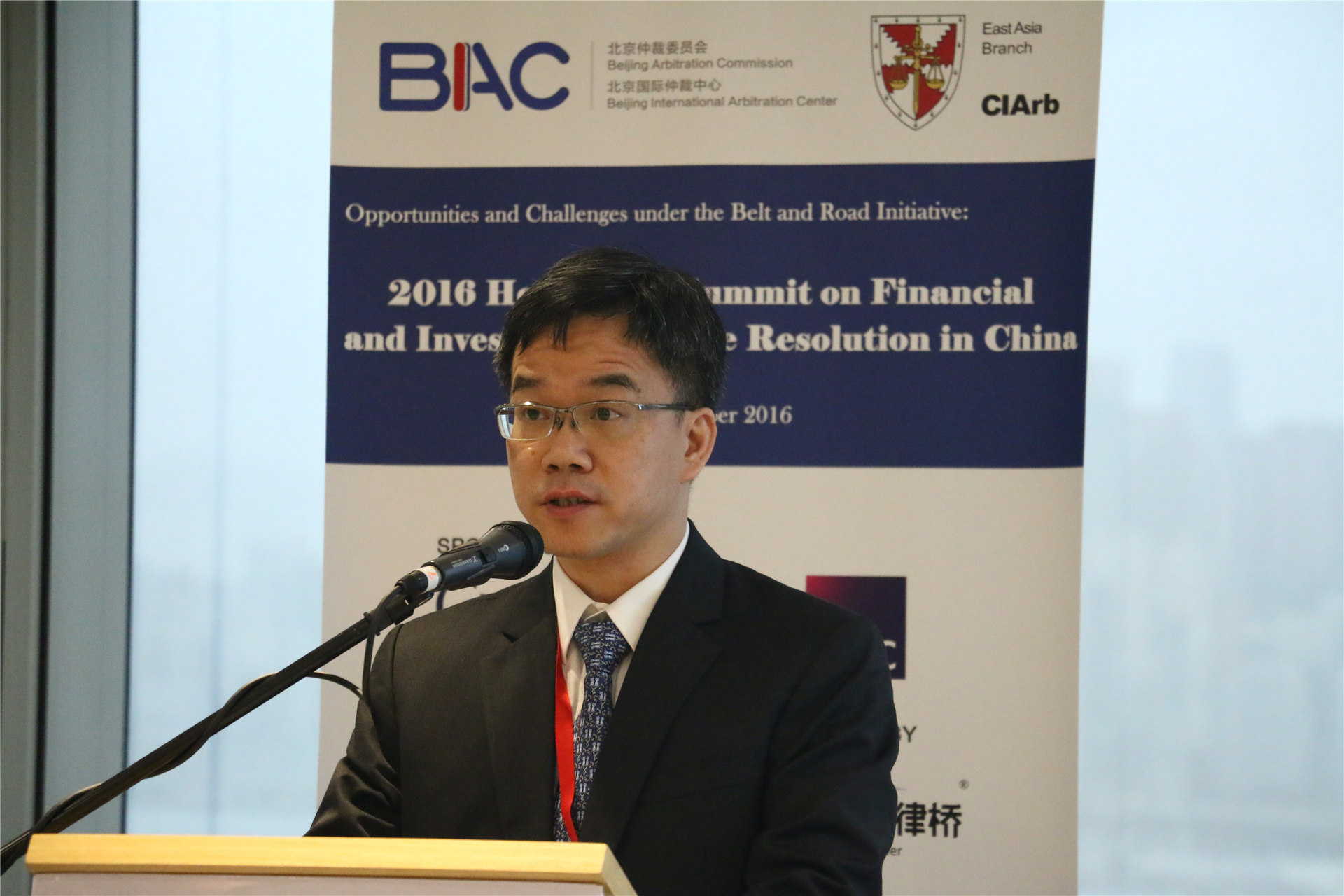
Mr. Richard Leung
Mr. Wang Zhenmin fully affirmed the significance of arbitration under the Belt and Road Initiative, and recalled his experience working with the BAC to host the arbitrator training courses and with Ms. Teresa Cheng, SC, Chairperson of the Hong Kong International Arbitration Centre, to launch the International Arbitration LLM program when he was acting as the president of the Tsinghua University School of Law. Mr. Wang said that from its launch in 2013, the Belt and Road Initiative has so far attracted more than 60 countries to join in. China as the proposer of this Initiative has played an important role, whereas Hong Kong as a financial and legal center of China would also provide the contribution it deserves with its advantages in financial and legal resources.
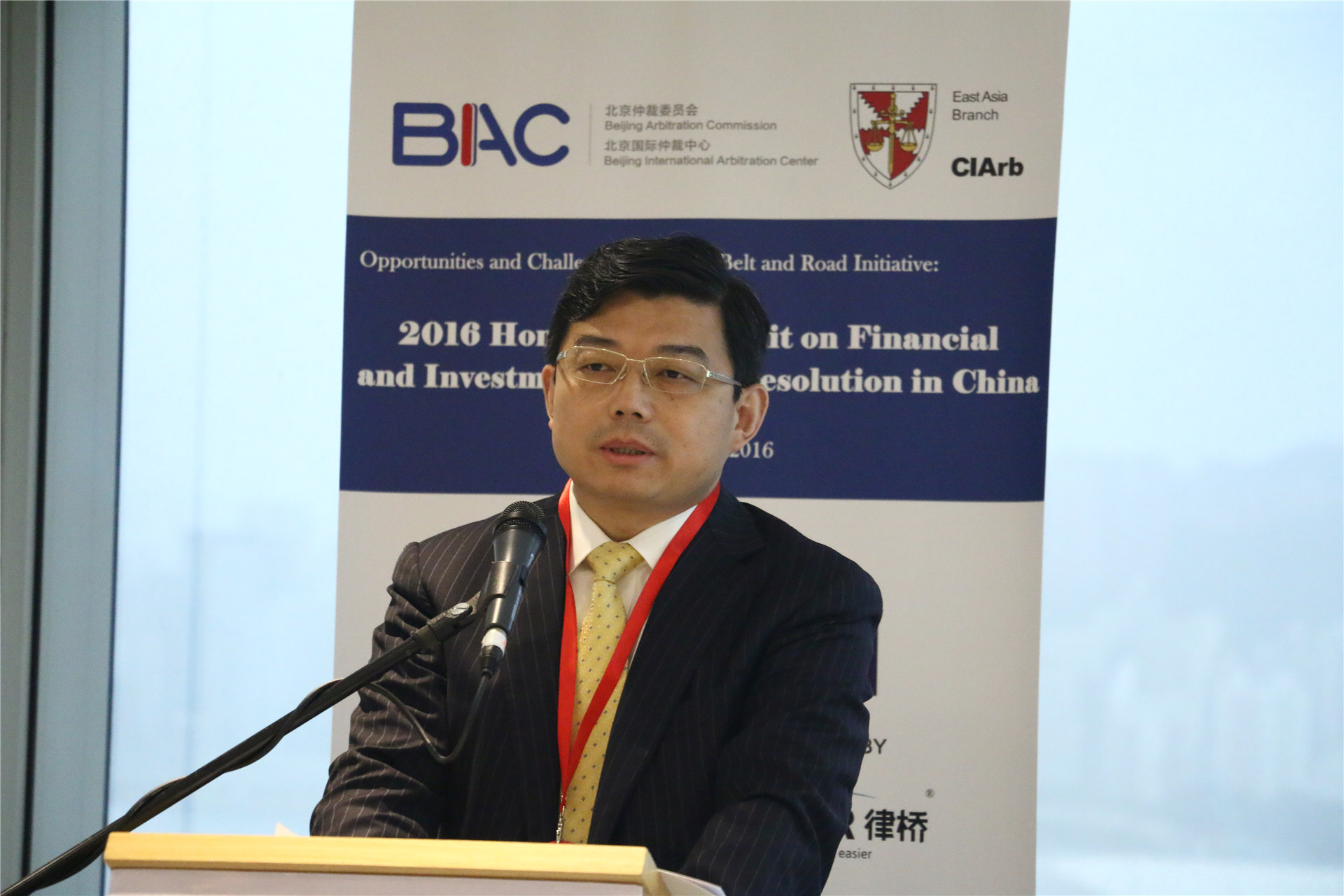
Mr. Wang Zhenmin
Following the opening ceremony, Dr. Chen Fuyong, Deputy Secretary General of the BAC, delivered an impressive speech themed “A General Introduction on Commercial Dispute Resolution in China: An Annual Review and Preview (2013-2016)”. He introduced the BAC’s experience in organizing the Commercial Dispute Resolution in China: An Annual Review (the “Annual Report”) series and successive overseas launch events thereof. He gave thanks to both Chinese and foreign experts and institutions that have engaged in and provided support to the preparation of the Annual Report during the past years, and stressed that the BAC’s Annual Report overseas launch events series were important media for the globe to learn about the status quo of commercial dispute resolution development in China that helped promote the economic and legal exchanges between China and other states. With the past three years’ accumulation, the Annual Report series have won growing reputation abroad, and now have become important resources for the globe to study the commercial and legal environment of China. Apart from that, Dr. Chen also presented an introduction of the arbitration development in mainland China in recent years based on detailed statistics to attendees, and shared his thinking about how internationalized arbitration institutions like the BAC could better meet the demand of international dispute resolution as well as better promote the growth of international trade under the Belt and Road Initiative. At last, Dr. Chen expressed his strong expectation for future prosperity of both Chinese and international commercial dispute resolution.
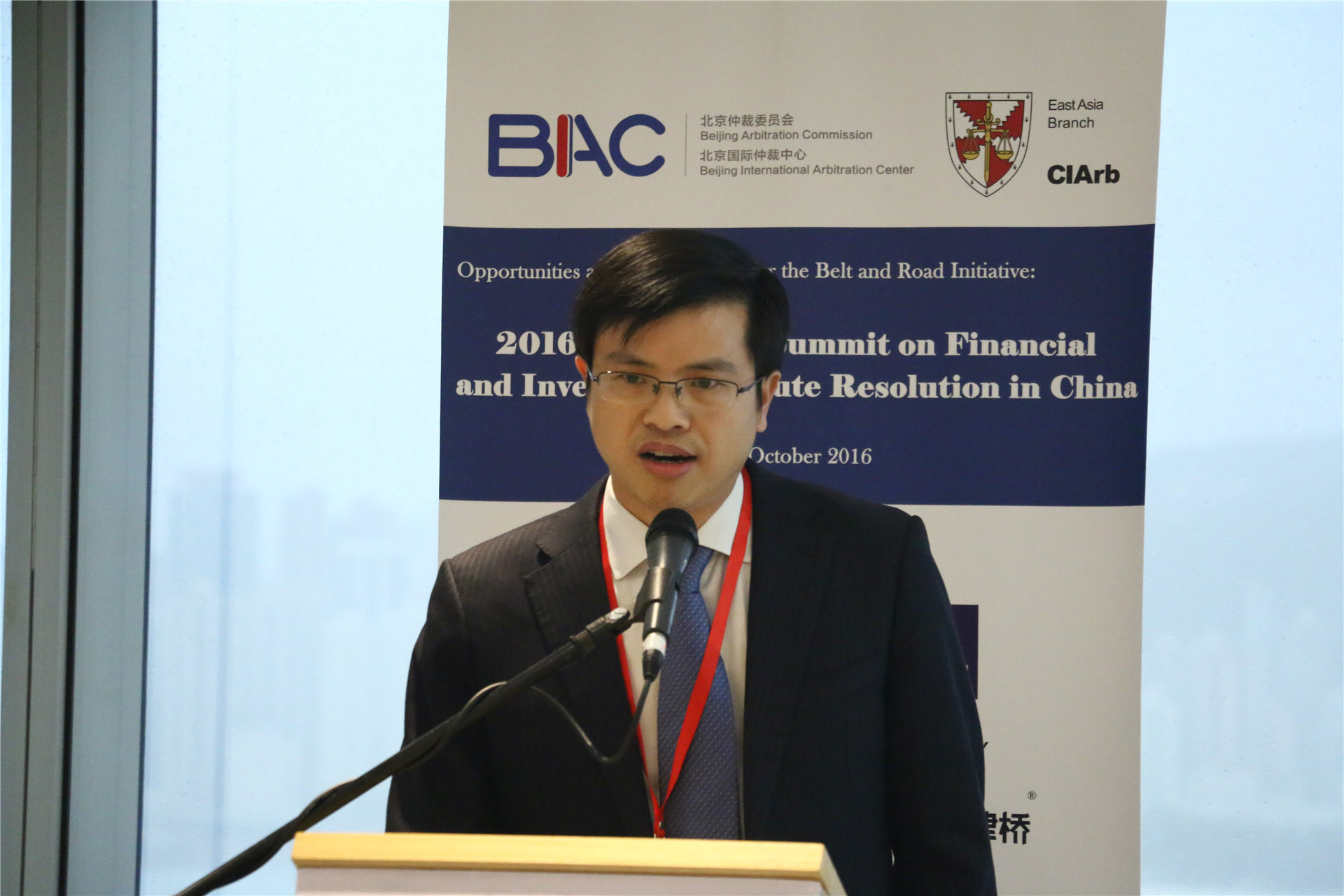
Dr. Chen Fuyong
Professor Anselmo Reyes, SC of the University of Hong Kong, as the moderator and the commentator of this session, gave full affirmation to the BAC’s development in recent years, as well as appreciation for the BAC’s endeavors in promoting international exchange and cooperation within the dispute resolution community.
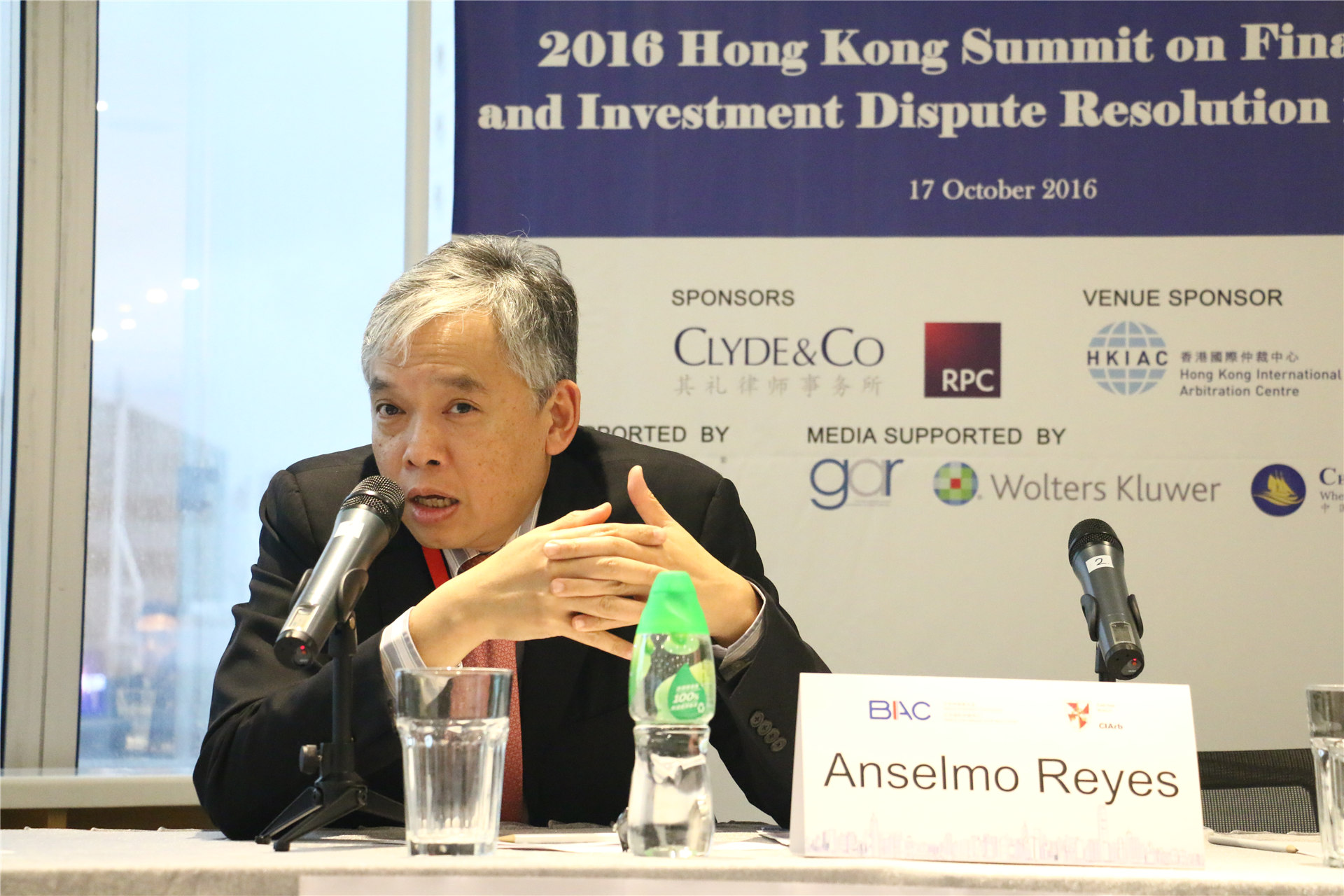
Prof. Anselmo Reyes, SC
Thereafter, the Summit came to the session on “Belt and Road Initiative and Financial Dispute Resolution in China”. This session was moderated by Ms. Teresa Cheng, SC, Chairman of the Hong Kong International Arbitration Centre. Dr. Tao Xiuming, Senior Partner at JunZeJun Law Offices and the author of the Sub-Report on Financial Dispute Resolution of the Commercial Dispute Resolution in China: Annual Review and Preview (2016), acted as the keynote speaker, and Mr. Rupert Boswall, Senior Partner at RPC and Mr. Rollin Chan, Head of Legal of Deutsche Bank China, as commentators. Dr. Tao started his speech from both domestic and international practice, and made a comparison between litigation and arbitration as to which one was more preferred by parties in financial disputes, summarizing that both international and domestic practice are increasingly prioritizing arbitration for financial disputes. Furthermore, he provided a detailed clarification of the characteristics of financial disputes in China, so as to help attendees to look into the development and dispute resolution practice of the Chinese financial industry, with an analysis of current challenges the Chinese financial dispute resolution faced and the influence of the Belt and Road Initiative on financial disputes. Ms. Cheng shared her view on the issue of loss computation that is frequently seen in financial disputes. Mr. Rupert Boswall and Mr. Rollin Chan then made insightful comments on Dr. Tao’s speech from aspects of lawyers and in-house counsels, respectively. With a sample case he has been engaged in, Mr. Rupert Boswall introduced how courts and arbitral tribunals defined and computed losses in financial disputes, and the major considerations of financial institutions in their selection of litigation or arbitration when drafting dispute resolution clauses. Based on the principle of fairness, Mr. Rollin Chan discussed the considerations of judges and arbitrators as to the loss computation when handling financial disputes, and pointed out that with the progress of the Belt and Road Initiative, the parties would more and more select arbitration to resolve disputes. Following the discussion, the speakers and the attendees had an exchange, where the speakers answered questions from attendees.
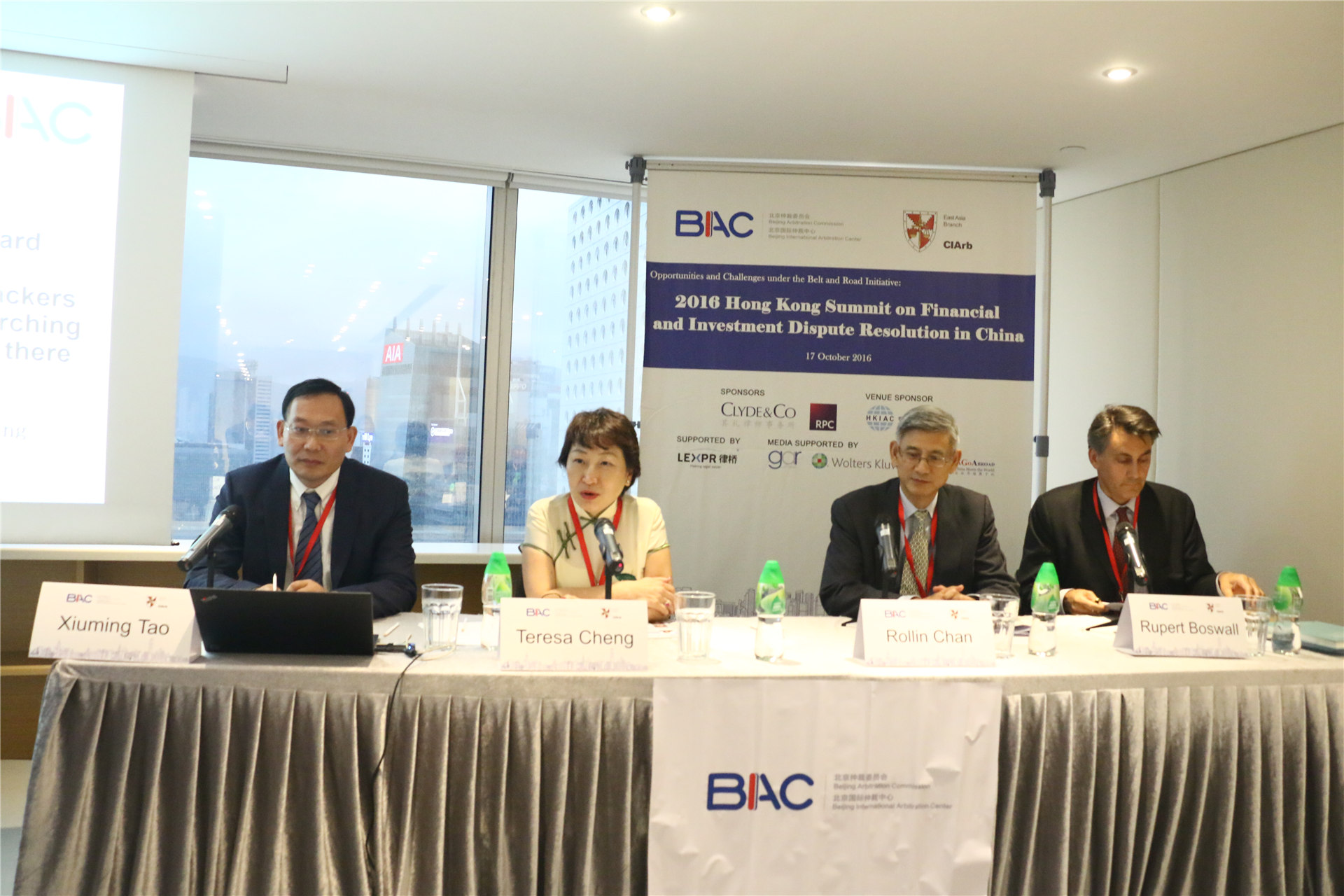
Session on “Belt and Road Initiative and Financial Dispute Resolution in China”
Next to the session on financial dispute resolution, Professor Philip Yang, BBS, Former President of Asia Pacific Region Arbitration Group, continued to moderate the session on “Belt and Road Initiative and Investment Dispute Resolution in China”. In this session, Mr. Bao Zhi, Partner at FenXun Partners and the author of the Sub-Report on Investment Dispute Resolution of the Commercial Dispute Resolution in China: Annual Review and Preview (2016), acted as the keynote speaker, and Mr. Patrick Zheng, Partner at Clyde & Co (Beijing Office) and Mr. Mohan Datwani, Senior Director of the Hong Kong Institute of Chartered Secretaries, as commentators.
Mr. Bao firstly presented a general introduction of China related cross-border investment dispute resolution from perspectives of commercial disputes and investor-state disputes, inbound investment and outbound investment, arbitration and litigation. He also illustrated the characteristics, categories and legal environment of inbound and outbound investment and investment disputes. At last, he provided brief comments and analysis on investor-state disputes. Mr. Patrick Zheng and Mr. Mohan Datwani then made insightful comments on Mr. Bao’s speech. Mr. Zheng introduced the status quo of Chinese investment arbitration from the aspect of investor-state arbitration, including the conclusion of bilateral treaties between China and other states and relevant reservations, and also the application of China’s bilateral treaties for Hong Kong and Macau by referring to Sanum v Laos. With his experience of investment in Mongolia as an example, Mr. Mohan Datwani introduced legal risks required attention for investing in Belt and Road countries, and emphasized the potential problems in overseas investment due to cultural and linguistic discrepancies. After their speeches, the speakers answered questions from attendees.
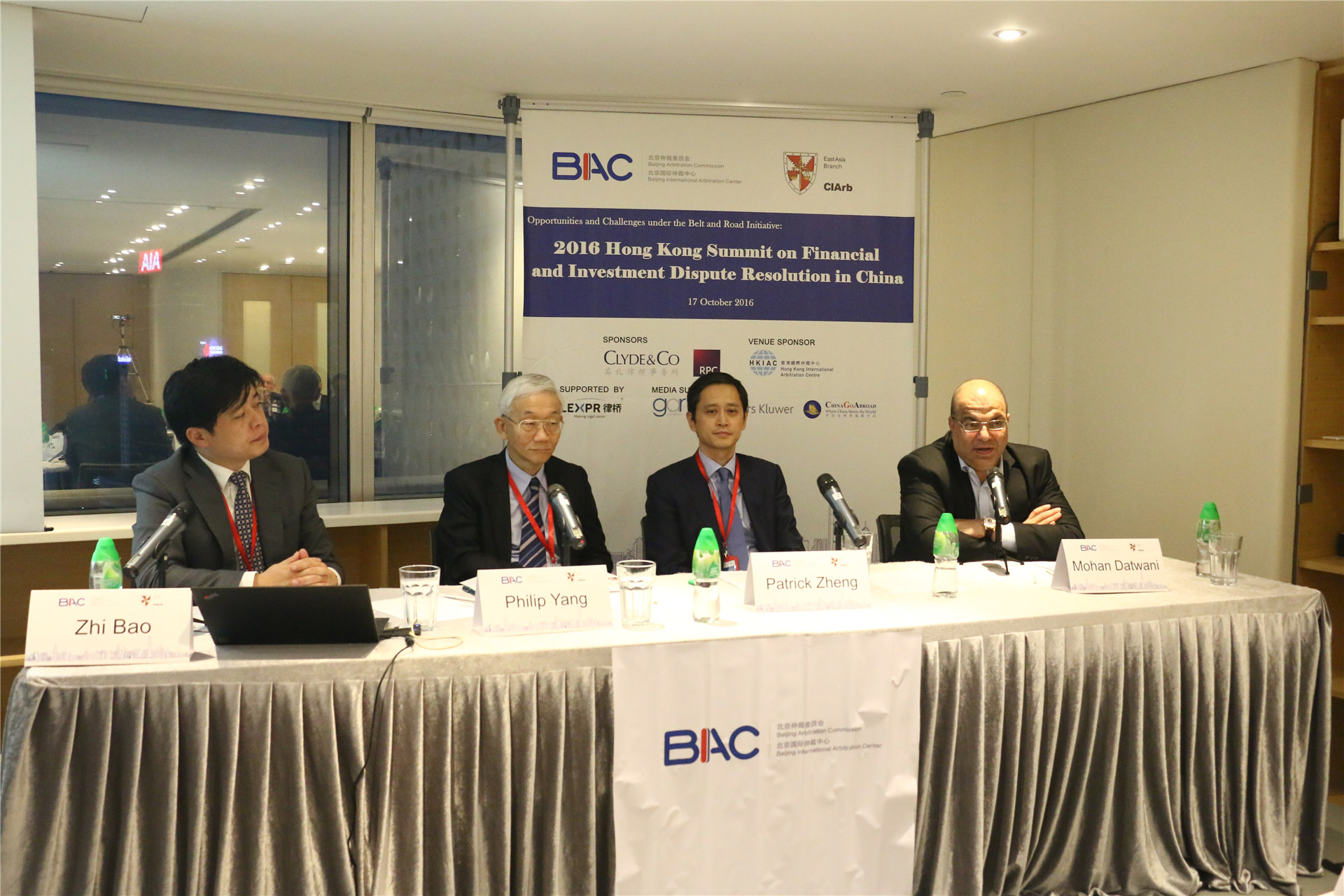
Session on “Belt and Road Initiative and Investment Dispute Resolution in China”
After the two hours’ discussion full of insights and highlights, the Summit came to its closing ceremony. The Honorable Mr. Rimsky Yuen, SC, JP, Secretary for Justice of the Hong Kong SAR, was present and delivered the closing address. He made a sum-up of the Summit and pointed out that with the furtherance of the Belt and Road Initiative, the economic and trading cooperation among Belt and Road countries would become even more closer, and thus the requirement for dispute resolution services would be on rise, which not only include post-dispute arbitration and mediation, but also pre-dispute legal services for the avoidance of disputes. Meanwhile, he stressed that statistics have shown that arbitration was still the prioritized dispute resolution mechanism preferred by parties in international commerce. Since the legal systems differ among the Belt and Road countries, there is by far no uniform dispute resolution mechanism for disputes that may arise from the implementation process of the Belt and Road Initiative, and it is therefore a shared topic for the whole international arbitral community to discuss and cooperate as to how the existing international arbitration system could be fitted into Belt and Road disputes. Only with strengthened cooperation could legal communities of Belt and Road countries better assist with the Belt and Road Initiative and enjoy win-win benefits.
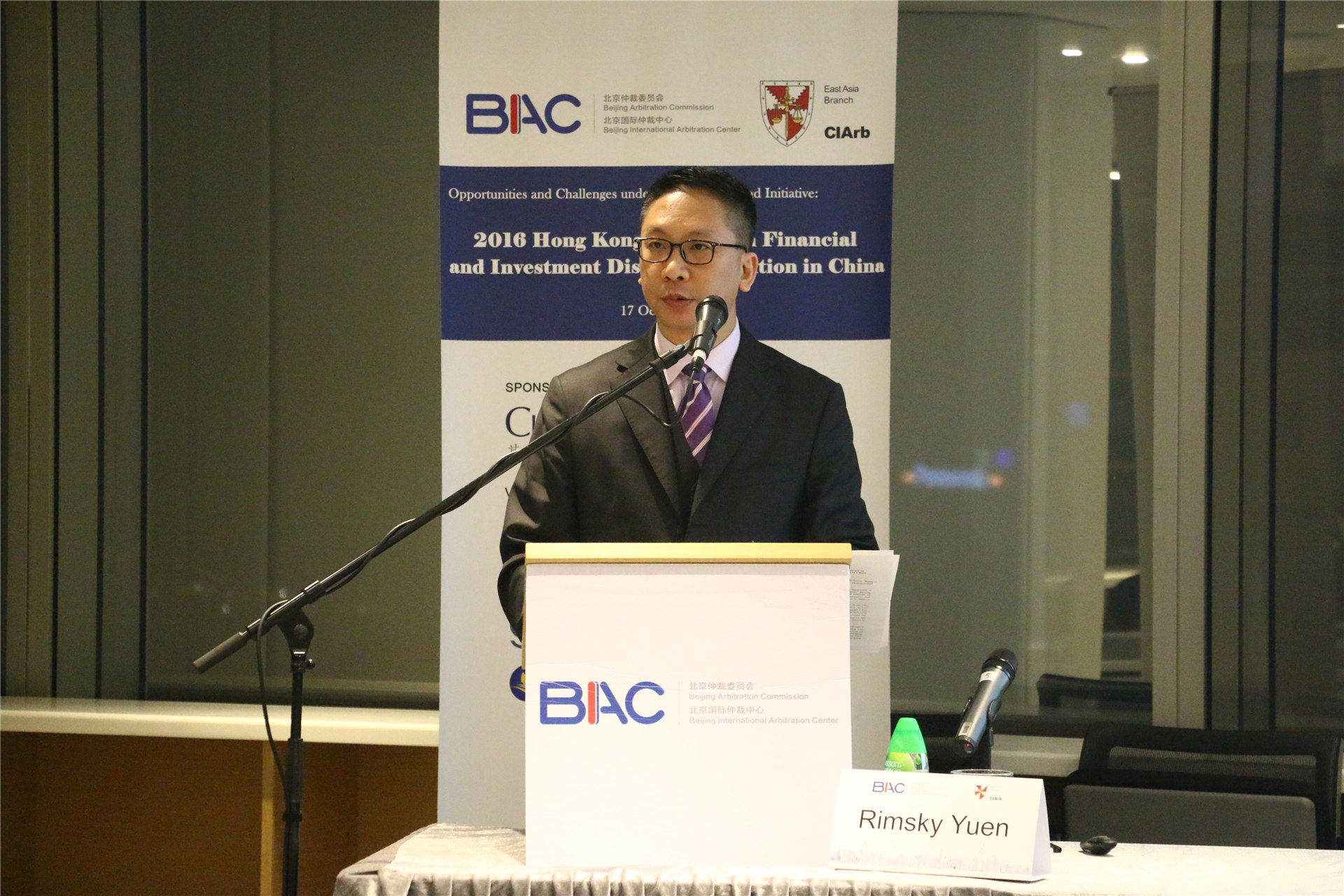
The Honorable Mr. Rimsky Yuen, SC, JP
Up to this point, the Summit has come to a successful end, and attendees had group photos with The Honorable Mr. Rimsky Yuen, SC, JP. This Summit was the BAC’s first major event in Hong Kong, and also the first launch event of the Annual Report series in Hong Kong. Due to time limit, this Summit mainly focused on financial and investment dispute resolution, still it was well received as expected, which was undoubtedly a solid start. The Summit revealed the huge achievement and progress of dispute resolution such as commercial arbitration in mainland China, further strengthened the BAC’s ties with legal and arbitration professionals in Asia and Pacific area, deepened each other’s knowledge and understanding about dispute resolution practice, and conducted preliminary discussion on dealing with more and more investment and financial disputes that might emerge under the Belt and Road Initiative. It laid a sound foundation for legal professionals from Asia and Pacific area and Belt and Road countries to have further in-depth exchanges on and jointly resolve international investment and financial disputes, and will essentially provide impetus for building a more professional, cooperative and systematic international dispute resolution community.
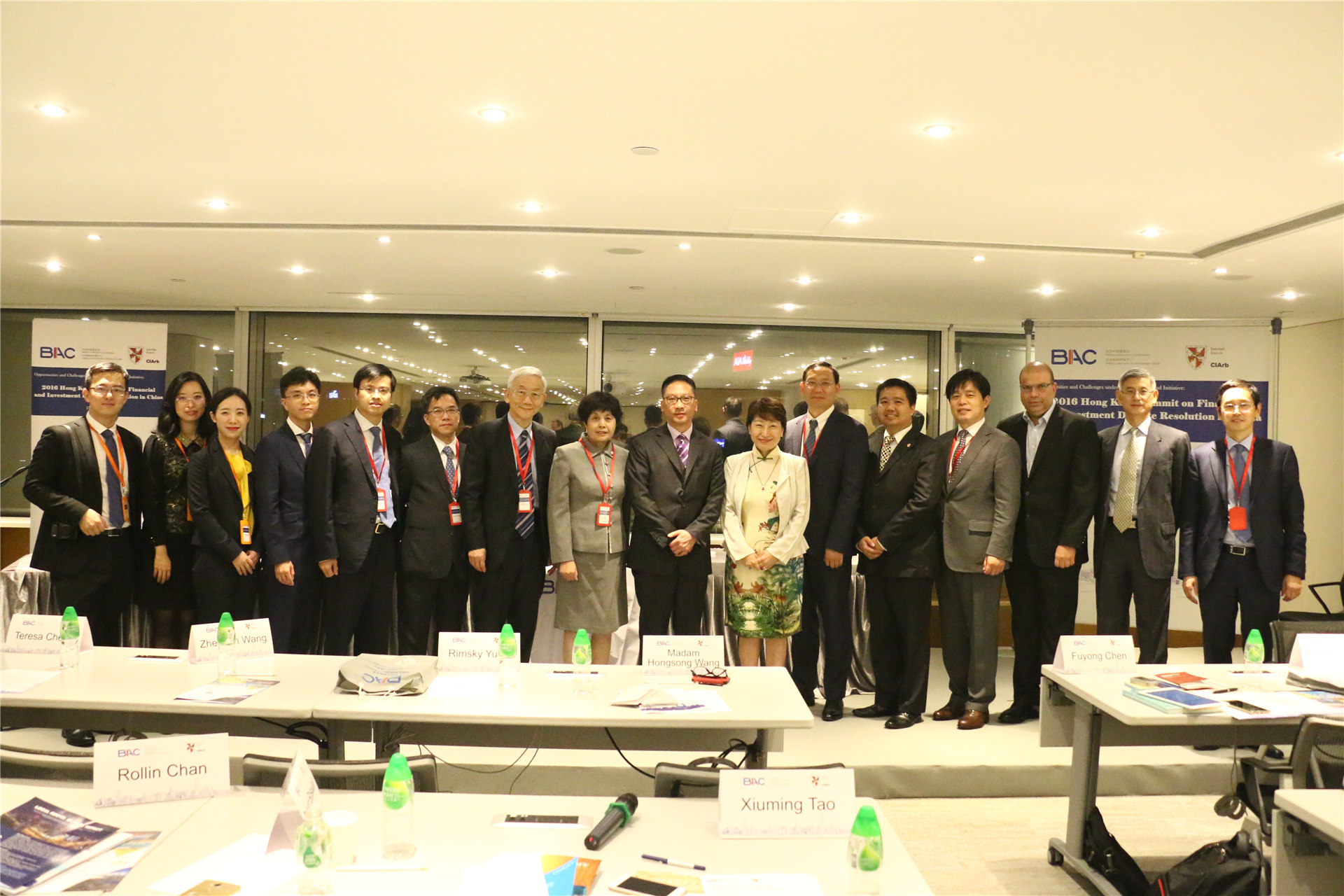
Group photo
This Summit could not be such a success without the strong support of the CIArb (EAB) and the generous assistance in providing venue and facilities of the Hong Kong International Arbitration Centre, as well as the sponsorships from Clyde & Co and Smith & Co in association with RPC, with support by LexPR and media support jointly provided by the Global Arbitration Review, Wolters Kluwer and ChinaGoAbroad.